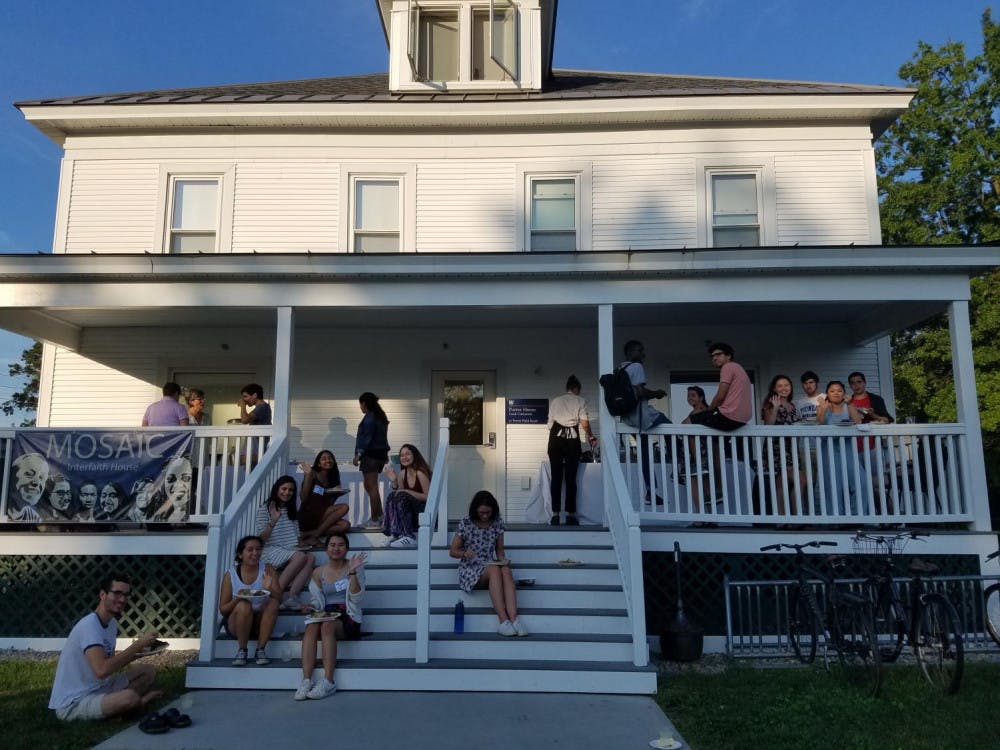The Scott Center for Spiritual and Religious Life opened the Mosaic Interfaith House at the beginning of this school year. The house, a residential space intended for those committed to education through cultural exchange, strives to form and nurture a bonded community. Mosaic, located in the Porter House just off South Main Street, houses 14 students of different faith backgrounds including atheists, Muslims, Catholic and Protestant Christians, agnostics, Hindus, and Buddhists. According to the Scott Center, the students meet weekly to discuss the state of their community and program events. They also pick various holidays and rituals to observe together. The Interfaith House’s primary purpose is to provide a learning environment for its residents.
Varsha Vijaykumar ’20, who was raised in a Hindu household but now identifies as a spiritual atheist, expressed her desire to fight misconceptions of those who “do not necessarily agree with organized religion or believe in any supreme, universal force.” She said that through the Interfaith House she hopes to show that she doesn’t have to “believe in a God” in order to “live just as intentionally and kindly as others.”
Dean of Spiritual and Religious Life Mark Orten, who helped found the Interfaith House, emphasized the need to remember religious diversity, which is forgotten in many conversations of inclusivity.
“If we are to live fully in the world, much less to effect real and positive change, we must be more knowledgeable, more literate, about where these frameworks come from and what lies beneath them,” he said. Orten hopes the house will help raise awareness of secular philosophies and minor religious communities.
While Orten stressed the importance of discussion and spreading awareness, he believes that experiential learning is a vital step towards understanding the role of spiritualism in our world. Rather than merely debating and advocating for the effects of religious diversity, the residents of Mosaic live it. Toni Cross ’18 described how students in the house encounter “opportunities for divergence, conversation, and finally, reconciliation” in their day-to-day activities. This idea of reconciliation, of having to mediate differences, makes the Interfaith House a unique residential space on campus. Cross cites the most tangible example of this as, “how to use the kitchen space in a way that’s cognizant of people’s dietary practices.”
Vijaykumar agreed, explaining that when her housemates worked through this issue, she felt they respected her and her needs. She called for this active sharing of cultures in order to distance ourselves from the stereotypes we have embedded within us “in a time in our history in which people are being denigrated simply because of their beliefs.”
The creation of the Interfaith House comes on the heels of several acts of hate speech against religious minorities on campus and in the wider Middlebury community. Following the presidential election last year, one student found a derogatory message on her dorm room whiteboard. A week later, a swastika was drawn on the door of the Havurah House in Middlebury. Cross feels these cases crystallized the need to celebrate and honor the campus’ religious diversity. “[It] felt like it was more important than ever to show that peaceful, intentional coexistence is possible and preferable,” she said.
Dean Orten affirmed that Mosaic is, by nature, a space for “cooperation” and “communication.” As Cross said, the diverse residents must be “interested in different faiths” and still “be flexible about living with other people whose values might be different than theirs.”
“[The students living in the Interfaith House are] just a group of people living together who talk with God, or don’t talk with God, in different ways,” Cross said.
Vijaykumar described how her housemates take care of each other by making tea, baking treats, and getting caffeinated candies for each other ahead of a long night.
“[Living in this house] is an experience that I wish everyone at Middlebury could take part in,” she said. “The sense of community that I feel with all of these people that come from backgrounds completely different from mine proves that love and respect erase all of the walls and borders that otherwise separate us. No matter how cheesy that sounds, it’s still completely true.”
Interfaith House Offers Space for Diversity and Discussion

Comments


